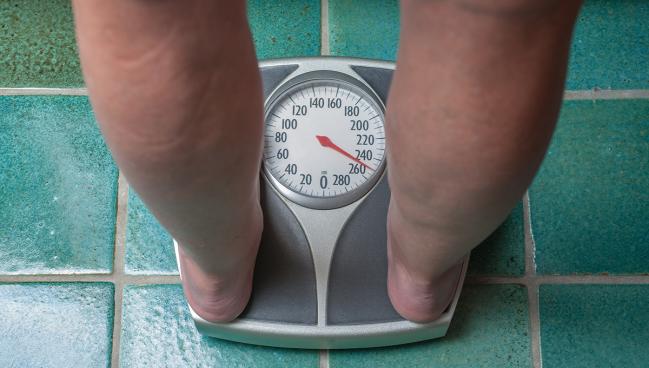SURMOUNT-1: Tirzepatide Drastically Reduces Weight in Obese Patients
Trials in higher-risk individuals are needed to tease out whether the weight loss also improves CV outcomes, an expert notes.

In patients without diabetes who are obese, a once-weekly injection of tirzepatide (Mounjaro, Eli Lilly) may help shed weight and improve some risk factors for CVD, including blood pressure and cholesterol levels as well as prediabetic status, results from the SURMOUNT 1 clinical trial show.
“All three doses of tirzepatide demonstrated substantial, clinically meaningful, and sustained bodyweight reduction compared to placebo,” said Ania M. Jastreboff, MD, PhD (Yale University School of Medicine, New Haven, CT), who presented the findings last weekend at the American Diabetes Association 2022 Scientific Sessions in New Orleans, LA. The results were simultaneously published in the New England Journal of Medicine.
Those assigned to tirzepatide 5 mg, 10 mg, or 15 mg also had greater changes than those on placebo in systolic and diastolic BP, fasting insulin, and total and other cholesterol levels. By the end of the 72-week study, 95.3% of those on tirzepatide who were classified as prediabetic at baseline had reverted to normoglycemia versus 61.9% in the placebo group.
Following Jastreboff’s presentation, moderator Jamy D. Ard, MD (Wake Forest School of Medicine, Winston-Salem, NC), told the audience: “If you’re not excited, you might want to check your pulse.”
Tirzepatide is the first in a new class of incretin-based agents that activate glucagon-like peptide-1 (GLP-1) and glucose-dependent insulinotropic polypeptide (GIP), hormones involved in the regulation of blood sugar. GLP-1 increases satiety and decreases gastric emptying, while GIP is thought to affect regulation and storage of adipose tissue. Tirzepatide was approved last month by the US Food and Drug Administration to improve blood sugar control in patients with type II diabetes, as an adjunct to diet and exercise. In clinical trials that led to the approval, tirzepatide 15 mg was more effective at lowering HbA1c and led to more weight loss than semaglutide (Wegovy, Novo Nordisk), insulin degludec (Tresiba, Novo Nordisk), and insulin glargine.
If you’re not excited, you might want to check your pulse. Jamy D. Ard
Benjamin M. Scirica, MD (Brigham and Women’s Hospital, Boston, MA), who commented on the SURMOUNT-1 results for TCTMD, said for many of his nondiabetic patients with CVD, “their severe obesity is in many ways the most important health problem that they have and the most frustrating both for them and to a lesser importance me, because we have so few options to help them with their weight.”
Scirica added that sicker CVD patients are typically the ones who despite needing to lose weight can’t qualify for bariatric surgery, making it difficult to move the needle much to improve their cardiometabolic health.
“We may never be able to tease out whether it’s the weight loss to the extent seen in this trial that is the most benefit, or if it’s a direct effect on cardiovascular risk factors like lipids and blood pressure, or if there are other unmeasured benefits in terms of altering the ecosystem of adiposity,” he added. “I think where we need to go from a practice standpoint and a clinical research standpoint is we do have to work to get studies that demonstrate that this type of weight loss will manifest itself in cardiovascular outcome improvement.”
Scirica added that the positive results from this trial will likely increase interest in dedicated CV outcomes trials for tirzepatide.
SURMOUNT-1 Results
The SURMOUNT-1 trial was conducted from December 2019 through April 2022 at 119 sites in nine countries. Individuals without a diagnosis of diabetes (mean age 45 years; 67.5% female) were enrolled if they had a body mass index (BMI) of 30 or greater, or 27 or greater plus at least one weight-related risk factor such as hypertension, dyslipidemia, obstructive sleep apnea, or CVD. Baseline weight was approximately 231 pounds. All also were required to have been unsuccessful in one or more diet attempts. Tirzepatide or placebo were initially started at 2.5 mg once weekly and increased by 2.5 mg every 4 weeks during a dose-escalation period to reach a maintenance dose of up to 15 mg a week by week 20.
At 72 weeks, the mean reduction in body weight was 15% in the 5-mg group, 19.5% in the 10-mg group, 20.9% in the 15-mg group, and 3.1% in the placebo group. In pounds lost, those changes translated to 35.5, 48.9, 52.0, and 5.3, respectively. Overall, more than 90% of those on tirzepatide 15 mg achieved the co-primary endpoint of weight reduction of 5% or more. Nearly 60% achieved a target of 20% or greater reduction in weight from baseline, and about one-third had a reduction of 25% or more. At both the 10- and 15-mg doses, nearly all patients lost weight, with an expected heterogeneity in response among participants.
The advantage for tirzepatide was evident as early as 4 weeks after treatment began, and by week 20 the pooled tirzepatide groups were down an average of 22 pounds (10.1 kg) compared with the placebo group (P < 0.001).
Approximately 80% of patients receiving tirzepatide reported at least one adverse event (as did 72% in the placebo group). The most common adverse events were nausea, diarrhea, and constipation and occurred primarily during the dose-escalation phase. Since the study was conducted during the COVID-19 pandemic, a significant percentage of serious adverse events were attributed to coronavirus infection. Four participants developed pancreatitis: one in each of the three treatment groups and one in the placebo group. Similarly, cholelithiasis occurred in seven patients on the 5-mg dose, nine patients on the 10-mg dose, four patients on the 15-mg dose, and six patients on placebo.
Future Questions
In an editorial accompanying the study, Clifford J. Rosen, MD (Tufts University School of Medicine, Boston, MA), and Julie R. Ingelfinger, MD (Massachusetts General Hospital, Boston, MA), note that the magnitude of weight loss with tirzepatide is similar to what is seen with gastric bypass. However, they question how the drug will ultimately need to be used for permanent weight loss, including whether individuals can use it at intervals.
Another issue is whether tirzepatide is purely benign in terms of long-term adverse CV effects. Drugs like phentermine/fenfluramine, sibutramine, and lorcaserin were once considered options for obesity before they were linked to increased incidence of cardiac valvulopathy, stroke, and cancer, Rosen and Ingelfinger point out.
Does this really just have a great effect when you're taking it, or does it help reset the metabolic thermostat such that they now will be in a better place to maintain a healthy weight? Benjamin M. Scirica
To TCTMD, Scirica said incretin therapies have been around for decades in diabetes treatment, albeit at lower doses than were used in SURMOUNT-1 for obesity, and appear to be well tolerated with no signal of harm from a CV standpoint. However, tirzepatide is unusual in having dual agonism by combining GLP-1 and GIP.
“So, understanding the potential for cardiovascular benefit is quite important, because it's the first one to get this far in development,” he added. “I think we will see in the next few years cardiovascular outcome trials in a much higher risk population. Then the cost issue will also need to be addressed, because it is quite expensive and the requirement for how long it needs to be used is also going to be important. Also, there have not been studies [long term] of the effect if somebody does come off the drug. Does this really just have a great effect when you're taking it, or does it help reset the metabolic thermostat such that they now will be in a better place to maintain a healthy weight? We haven’t seen any of that data and it’s going to be important.”
In response to a question following her presentation about long-term continuation of tirzepatide, Jastreboff said the effect of stopping it appears to be similar to stopping antihypertensives, meaning it would need to be continued to maintain a lower set point of bodyweight.
“We don’t know what [maintenance] doses will need to be used,” she added. “Right now we know we need to continue the medicines.”
L.A. McKeown is a Senior Medical Journalist for TCTMD, the Section Editor of CV Team Forum, and Senior Medical…
Read Full BioSources
Jastreboff AM, Aronne LJ, Ahmad NN, et al. Tirzepatide once weekly for the treatment of obesity. N Engl J Med. 2022;Epub ahead of print.
Rosen CJ, Ingelfinger JR. Shifting tides offer new hope for obesity. N Engl J Med. 2022;Epub ahead of print.
Disclosures
- Jastreboff reports consultant or advisory fees from Boehringer Ingelheim, Eli Lilly, Intellihealth, Novo Nordisk, Pfizer and Scholar Rock; and research support from Eli Lilly and Novo Nordisk.
- Rosen and Ingelfinger are employed as associate and deputy editor, respectively, of the New England Journal of Medicine.
- Scirica reports no relevant conflicts of interest.




Comments